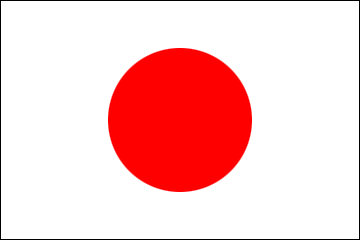NTV Live Panel Discussion on TICAD
2016/7/27
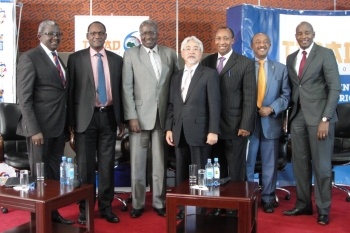
On Wednesday, July 27, 2016, exactly one month before the start of the historic 6th Tokyo International Conference on African Development, TICAD VI, the Embassy of Japan in conjunction with NTV and the Kenya Private Sector Alliance, KEPSA, held a Live Panel Discussion on TICAD.
The NTV Live Panel Discussion is part of a series of Pre-TICAD events aimed at creating a deeper understanding of TICAD: what it is, what discussions to expect and its impact on Africa past, present and future. Other events in this series included a policy workshop on the TICAD Process and Japanese Private Sector and a workshop on Kaizen and the TICAD Process.
The live panel discussion which was held at the Kenyatta International Convention Centre, KICC had an audience of over 150 including Kenyan government officials, members of the private sector, the academia and think tank.
The panelists for this discussion were Amb. Toshitsugu Uesawa, Ambassador of Japan to Kenya; Mr. Isaac P. Kalua, Chairperson of Green Africa Foundation; Dr. Chris Kiptoo, Principal Secretary of the State Department of Trade, Ministry of Industry, Trade and Cooperatives; Ambassador Dennis Awori, Chairperson of KEPSA; Mr. P. K. Ndungu the Acting Director General of the TICAD VI Secretariat, Ministry of Foreign Affairs and Mr. Gabriel Negatu the Regional Director of the East African Resource Centre, African Development Bank. As a moderator, Mr. Linus Kaikai, General Manager of NTV, participated in the discussion.
The NTV Live Panel Discussion is part of a series of Pre-TICAD events aimed at creating a deeper understanding of TICAD: what it is, what discussions to expect and its impact on Africa past, present and future. Other events in this series included a policy workshop on the TICAD Process and Japanese Private Sector and a workshop on Kaizen and the TICAD Process.
The live panel discussion which was held at the Kenyatta International Convention Centre, KICC had an audience of over 150 including Kenyan government officials, members of the private sector, the academia and think tank.
The panelists for this discussion were Amb. Toshitsugu Uesawa, Ambassador of Japan to Kenya; Mr. Isaac P. Kalua, Chairperson of Green Africa Foundation; Dr. Chris Kiptoo, Principal Secretary of the State Department of Trade, Ministry of Industry, Trade and Cooperatives; Ambassador Dennis Awori, Chairperson of KEPSA; Mr. P. K. Ndungu the Acting Director General of the TICAD VI Secretariat, Ministry of Foreign Affairs and Mr. Gabriel Negatu the Regional Director of the East African Resource Centre, African Development Bank. As a moderator, Mr. Linus Kaikai, General Manager of NTV, participated in the discussion.
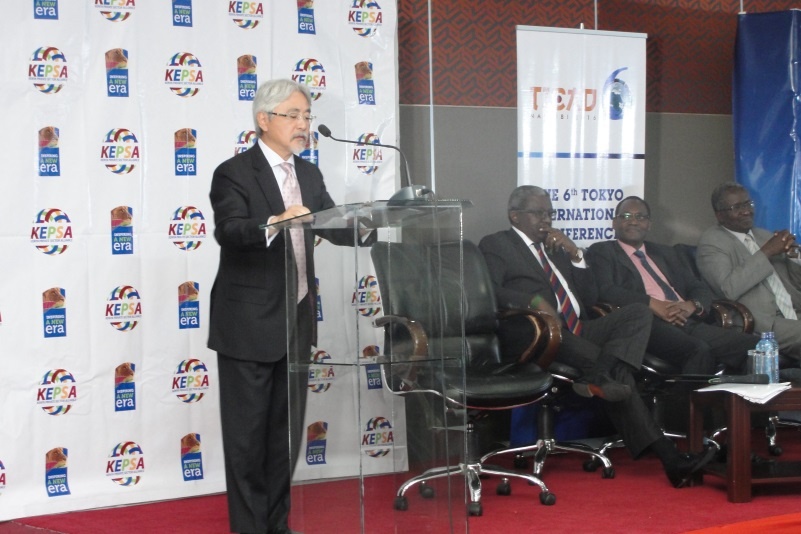
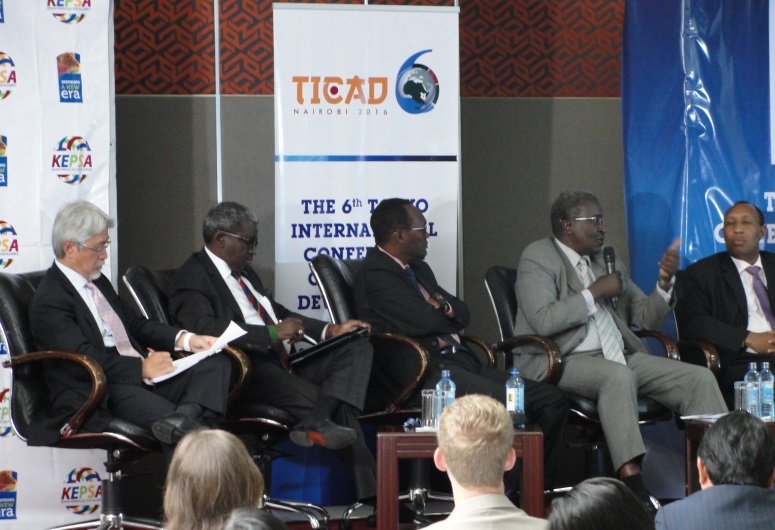
Ambassador Uesawa, in his key note address noted that Africa cannot escape responsibility for the challenges it faces. However, considering the historical genesis of some of these challenges, Africa is not solely responsible and should therefore not be expected to stand alone. TICAD, he said, has played a significant role in elevating Africa’s challenges to international challenges. Further to this, it was through the TICAD process that the international community endorsed the principles of the African Renaissance and the New Partnership for Africa’s Development (NEPAD).
Some of the issues expected to be discussed during TICAD VI as highlighted during the TICAD VI Ministerial Preparatory Meeting in Gambia in June include:
Mr. Kalua addressed the issue of trade imbalance which currently greatly favours Japan. He noted that Kenya, and Africa, needed to embrace a practical approach in reducing this gap. He stressed that Kenya could learn from Japan how to tackle economic diversification, industrialization, health and social issues which are necessary for a vibrant economy.
Still on the issue of trade imbalance, Dr. Kiptoo noted that the trade deficit is being improved through TICAD by, among other ways, trade investment, Sustainable Development Goals (SDGs), focus on health issues and infrastructure development. Regarding infrastructure development, Dr. Kiptoo gave the example of the Mombasa Port Development project which will increase the port capacity which will in turn improve the volume of imports and exports which will lead to further economic growth.
Ambassador Awori mentioned that a lot of the Official Development Assistance (ODA) Africa receives is non-focused. In contrast, any project delivered by Japan is bound to bring success because it is focused. To reiterate his point, he gave the example of Japan’s support in economic infrastructure through the opening up of the coastal region. Japan’s ODA has helped in opening up the coastal region thus increasing trade through the construction of the Kilifi Bridge, Mtwapa Bridge and Nyali Bridge, the construction of the Mombasa International Airport, the Mombasa Port Development project and now the construction of the Dongo Kundu Bypass Highway (commonly known as the Mombasa Southern Bypass). All these projects show a deliberate strategy to bring about development.
Further to this, Ambassador Awori highlighted Japan’s effort to enhance development through capacity building. He gave the example of the Japan initiated program Strengthening of Mathematics and Science in Secondary Education (SMASSE) noting that a country cannot industrialise without a base in mathematics and science. Mr. Ndungu agreed with Ambassador Awori adding that Japan has been instrumental in skills transfer through the training of thousands Kenyans in different technical fields in Japan.
Mr. Ndungu also noted that development must be sustainable. Many times, projects are initiated but fizzle out and die. However, when TICAD came on board, being hinged on ownership and partnership, the partners discussed what worked. This resulted in projects that positively affect the grassroots especially in agriculture, industry and human resource.
Mr. Gabriel Negatu stated that TICAD has been effective in raising the African issue around the global scene. This has led to the attraction of participation from other international partners. In this regard, Africa does not have to walk alone. However, if he had to rate the success of TICAD, he would give it “B” as investment from the Japanese private sector is still very conservative. He concluded that more than improving the political relationship between Japan and Africa, Japan should also improve on the business relationship.
Some of the issues expected to be discussed during TICAD VI as highlighted during the TICAD VI Ministerial Preparatory Meeting in Gambia in June include:
- The promotion of economic transformation where Africa reduces dependence on primary products and export of raw materials and instead discusses ways to advance economic diversification and industrialization.
- Creating a resilient health system to improve the quality of life of her people
- Social stability, specifically effective counters to the spread radicalism and terrorist threats including provision of hope for vulnerable groups especially for women and youth.
Mr. Kalua addressed the issue of trade imbalance which currently greatly favours Japan. He noted that Kenya, and Africa, needed to embrace a practical approach in reducing this gap. He stressed that Kenya could learn from Japan how to tackle economic diversification, industrialization, health and social issues which are necessary for a vibrant economy.
Still on the issue of trade imbalance, Dr. Kiptoo noted that the trade deficit is being improved through TICAD by, among other ways, trade investment, Sustainable Development Goals (SDGs), focus on health issues and infrastructure development. Regarding infrastructure development, Dr. Kiptoo gave the example of the Mombasa Port Development project which will increase the port capacity which will in turn improve the volume of imports and exports which will lead to further economic growth.
Ambassador Awori mentioned that a lot of the Official Development Assistance (ODA) Africa receives is non-focused. In contrast, any project delivered by Japan is bound to bring success because it is focused. To reiterate his point, he gave the example of Japan’s support in economic infrastructure through the opening up of the coastal region. Japan’s ODA has helped in opening up the coastal region thus increasing trade through the construction of the Kilifi Bridge, Mtwapa Bridge and Nyali Bridge, the construction of the Mombasa International Airport, the Mombasa Port Development project and now the construction of the Dongo Kundu Bypass Highway (commonly known as the Mombasa Southern Bypass). All these projects show a deliberate strategy to bring about development.
Further to this, Ambassador Awori highlighted Japan’s effort to enhance development through capacity building. He gave the example of the Japan initiated program Strengthening of Mathematics and Science in Secondary Education (SMASSE) noting that a country cannot industrialise without a base in mathematics and science. Mr. Ndungu agreed with Ambassador Awori adding that Japan has been instrumental in skills transfer through the training of thousands Kenyans in different technical fields in Japan.
Mr. Ndungu also noted that development must be sustainable. Many times, projects are initiated but fizzle out and die. However, when TICAD came on board, being hinged on ownership and partnership, the partners discussed what worked. This resulted in projects that positively affect the grassroots especially in agriculture, industry and human resource.
Mr. Gabriel Negatu stated that TICAD has been effective in raising the African issue around the global scene. This has led to the attraction of participation from other international partners. In this regard, Africa does not have to walk alone. However, if he had to rate the success of TICAD, he would give it “B” as investment from the Japanese private sector is still very conservative. He concluded that more than improving the political relationship between Japan and Africa, Japan should also improve on the business relationship.
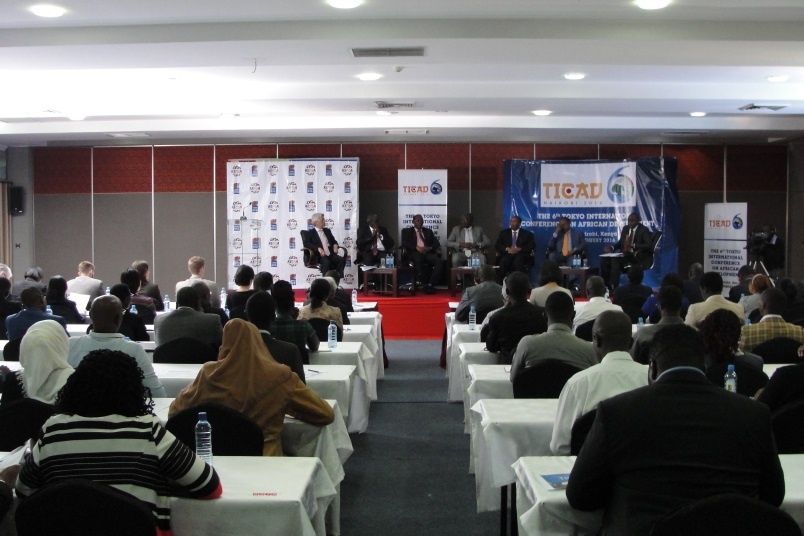
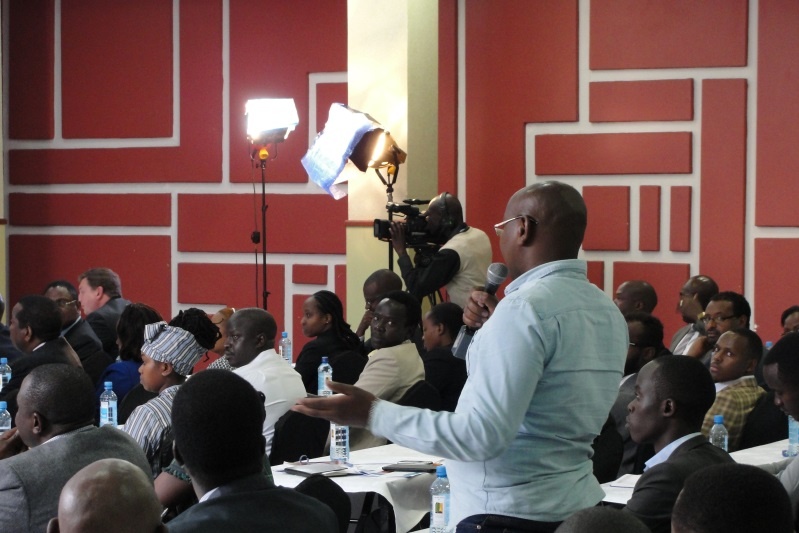
Following the initial comments from the panelists, Mr. Kaikai brought the discussion to the floor. The issues discussed by the panelists during this session included the views expressed by 10 Japanese scholars in the book titled “Contemporary African Economies: A Changing Continent under Globalisation” which puts forth the idea that wealth and growth in Kenya is focused on the elite and it does not reach the poor and is therefore not sustainable.
Regarding this issue, Mr. Negatu noted that the Kenyan development model was that of a private led economy which focused on growing the economy. He added that the role of government was to create an opportunity for the poor to bridge the gap and not to take from the rich to give to the poor. Dr. Kiptoo disagreed with the authors and pointed out that the government had made huge strides though devolution and fiscal decentralization and also through programs which had been put in place to address the marginalized groups. Mr. Kalua noted that it was important to appreciate where Kenya is coming from and what the government is doing. He further stressed the importance strengthening the Small and Medium Enterprises (SMEs) so that they could become the wheels that drive the economy as is the case in Japan. Amb. Awori reiterated this statement by adding that SMEs in Kenya tended to remain SMEs yet they had the potential to become world class enterprises.
The second issue addressed by the panelists was the stagnation of the manufacturing sector and the decline of productivity. Here, Mr. Ndungu noted that the main hindrance to manufacturing in Kenya is the cost of energy which is not conducive for a thriving manufacturing sector. Through TICAD partnership, Kenya received assistance in the development of geothermal energy. This has improved the capacity for electricity production.
The final session of the panel discussion was a question and answer session. Some of the questions raised were:
Regarding this issue, Mr. Negatu noted that the Kenyan development model was that of a private led economy which focused on growing the economy. He added that the role of government was to create an opportunity for the poor to bridge the gap and not to take from the rich to give to the poor. Dr. Kiptoo disagreed with the authors and pointed out that the government had made huge strides though devolution and fiscal decentralization and also through programs which had been put in place to address the marginalized groups. Mr. Kalua noted that it was important to appreciate where Kenya is coming from and what the government is doing. He further stressed the importance strengthening the Small and Medium Enterprises (SMEs) so that they could become the wheels that drive the economy as is the case in Japan. Amb. Awori reiterated this statement by adding that SMEs in Kenya tended to remain SMEs yet they had the potential to become world class enterprises.
The second issue addressed by the panelists was the stagnation of the manufacturing sector and the decline of productivity. Here, Mr. Ndungu noted that the main hindrance to manufacturing in Kenya is the cost of energy which is not conducive for a thriving manufacturing sector. Through TICAD partnership, Kenya received assistance in the development of geothermal energy. This has improved the capacity for electricity production.
The final session of the panel discussion was a question and answer session. Some of the questions raised were:
- what Japan looks for when it comes to industralisation and whether there is a particular model they prefer
- whether Japan has a cultural plan for a united Africa
- the need for improvement of capacity building in sports
- the possibility of having an anti-fraud clause in contracts
- whether cooperatives in Japan have contributed to the economy and the possibility of collaboration and trade between Japanese and Kenyan cooperatives
- what Kenya can borrow from devolution in Japan
